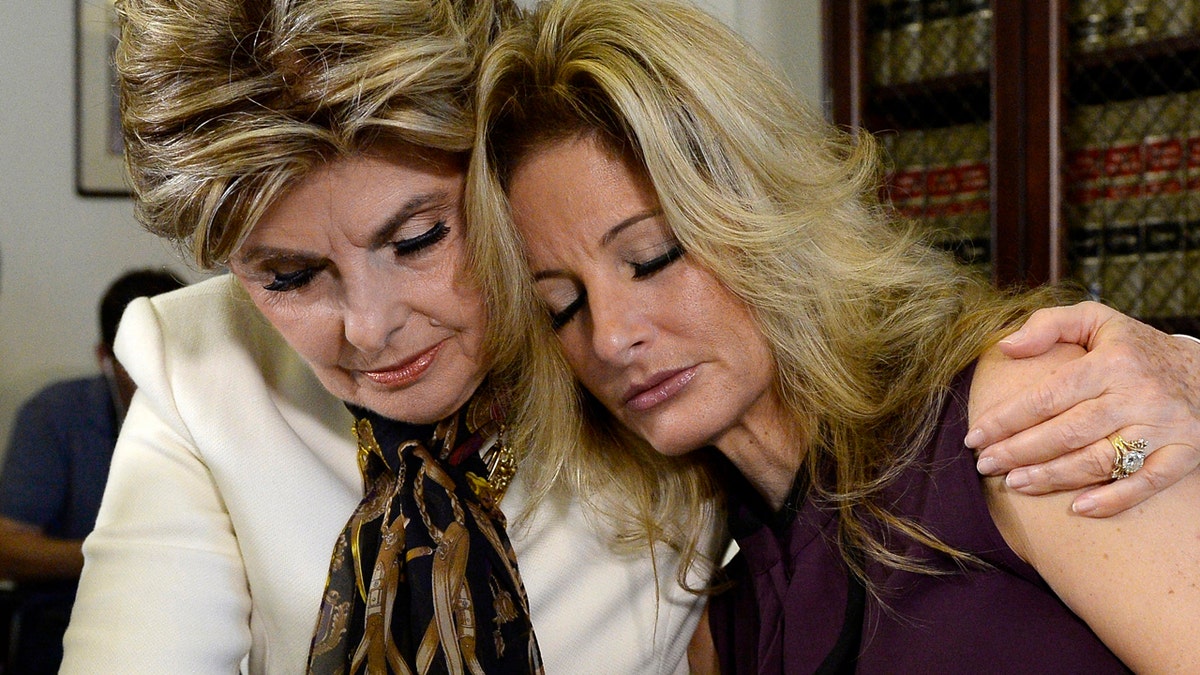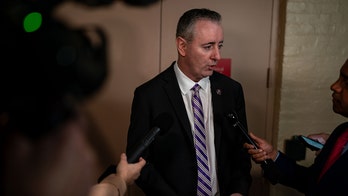
FILE: Summer Zervos, a former contestant on the TV show The Apprentice, is embraced by lawyer Gloria Allred (Reuters)
Arguing in part that a U.S. president cannot be sued in state court while serving in office, lawyers for President Donald Trump in a court filing late Friday called the dismissal of a complaint from a former contestant on the "Apprentice" television show who claims the president sexually harassed her a decade ago.
Summer Zervos, a California restaurant owner who appeared on the reality show in 2006, filed suit in against Trump in January in New York, alleging Trump defamed her during the presidential campaign when he said her sexual harassment complaints were false.
Zervos had accused Trump of aggressively kissing and grabbing her when she went to his bungalow at the Beverly Hills Hotel to discuss a possible job at the Trump Organization a year after she participated in the reality show that he hosted.
In a 53-page memo, Trump attorney Marc Kasowitz argued Zervos' allegations were false from the start, intended to hurt Trump's presidential campaign, and asserted her lawsuit now is merely an attempt to force Trump to submit to intrusive evidentiary discovery that could hurt his presidency. Zervos' attorney, Gloria Allred, has said she would seek to take Trump's testimony under oath as part of the lawsuit and could look for other evidence, including possible 'Apprentice' outtakes showing his behavior on the show's set.
Kasowitz, who is also representing Trump in ongoing probes of Russia's interference in the 2016 election, also wrote that president can only be sued through the federal court system while in office and any state action should be dismissed or postponed until after he leaves office.
The Supreme Court ruled in 1997 that the president can be sued for his private conduct while in office. That decision allowed a sexual harassment suit filed by Arkansas state employee Paula Jones to proceed against President Bill Clinton, a legal matter that ultimately resulted in impeachment proceedings against Clinton after he lied about his affair with intern Monica Lewinsky in a deposition taken as part of the case.
But Kasowitz argued the Supreme Court's opinion was narrowly limited to lawsuits filed in federal court. Zervos filed her case in New York State Supreme Court. The legal argument could have far-reaching consequences both for Trump, who has been frequently sued in state courts, and for future presidents, essentially declaring the president immune from many civil lawsuits.
Kasowitz also argued that Zervos' complaint should be dismissed because her original allegations against Trump were not true and, in addition, because Trump's campaign trail statements were protected the by First Amendment. A certain level of hyperbole is to be expected in the heat of a political campaign, he wrote, and such statements are legally protected speech.
During the campaign, Trump said the women who accused against him of inappropriately touching them were putting forward "made-up stories and lies" and "telling totally false stories." Kasowitz argued those statements and others could not be considered defamatory but instead were "nothing more than heated campaign rhetoric designed to persuade the public audience that Mr. Trump should be elected president irrespective of what the media and his opponents had claimed over his 18-month campaign."
Eleven women came forward to accuse Trump of touching, groping or kissing them without their permission in the final weeks of the campaign, after video emerged of Trump bragging about sexually assaulting women on an "Access Hollywood" appearance in 2005.
Zervos' attorney, Gloria Allred, did not immediately react to the new court filing late Friday. Zervos' legal response is due in court in August.




